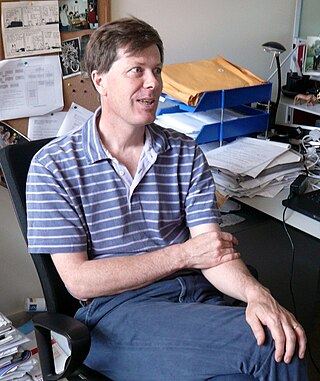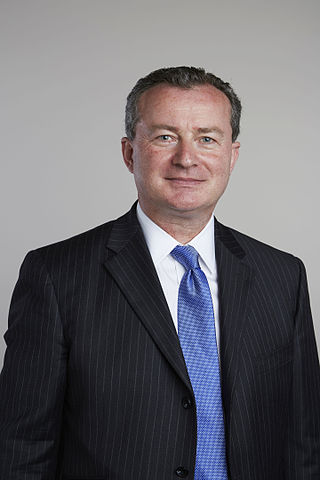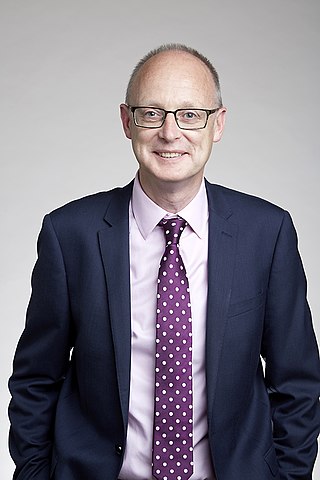Related Research Articles
A scientific wager is a wager whose outcome is settled by scientific method. It typically consists of an offer to pay a certain sum of money on the scientific proof or disproof of some currently-uncertain statement. Some wagers have specific date restrictions for collection, but many are open. Wagers occasionally exert a powerful galvanizing effect on society and the scientific community.

John Frederick William Birney is joint director of EMBL's European Bioinformatics Institute (EMBL-EBI), in Hinxton, Cambridgeshire and deputy director general of the European Molecular Biology Laboratory (EMBL). He also serves as non-executive director of Genomics England, chair of the Global Alliance for Genomics and Health (GA4GH) and honorary professor of bioinformatics at the University of Cambridge. Birney has made significant contributions to genomics, through his development of innovative bioinformatics and computational biology tools. He previously served as an associate faculty member at the Wellcome Trust Sanger Institute.

David Haussler is an American bioinformatician known for his work leading the team that assembled the first human genome sequence in the race to complete the Human Genome Project and subsequently for comparative genome analysis that deepens understanding the molecular function and evolution of the genome.

Richard Michael Durbin is a British computational biologist and Al-Kindi Professor of Genetics at the University of Cambridge. He also serves as an associate faculty member at the Wellcome Sanger Institute where he was previously a senior group leader.

Paul Reinhard Schimmel is an American biophysical chemist and translational medicine pioneer.

Sean Roberts Eddy is Professor of Molecular & Cellular Biology and of Applied Mathematics at Harvard University. Previously he was based at the Janelia Research Campus from 2006 to 2015 in Virginia. His research interests are in bioinformatics, computational biology and biological sequence analysis. As of 2016 projects include the use of Hidden Markov models in HMMER, Infernal Pfam and Rfam.

Laurence Daniel Hurst is a Professor of Evolutionary Genetics in the Department of Biology and Biochemistry at the University of Bath and the director of the Milner Centre for Evolution.

Richard M. Myers is an American geneticist and biochemist known for his work on the Human Genome Project (HGP). The National Human Genome Research Institute says the HGP “[gave] the world a resource of detailed information about the structure, organization and function of the complete set of human genes.” Myers' genome center, in collaboration with the Joint Genome Institute, contributed more than 10 percent of the data in the project.

Diethard Tautz is a German biologist and geneticist, who is primarily concerned with the molecular basis of the evolution of mammals. Since 2006 he is director at the Max Planck Institute for Evolutionary Biology in Plön.
Donna R. Maglott is a staff scientist at the National Center for Biotechnology Information known for her research on large-scale genomics projects, including the mouse genome and development of databases required for genomics research.

Anne Carla Ferguson-Smith is a mammalian developmental geneticist. She is the Arthur Balfour Professor of Genetics and Pro-Vice Chancellor for Research and International Partnerships at the University of Cambridge. Formerly head of the Department of Genetics at the University of Cambridge, she is a Fellow of Darwin College, Cambridge and serves as President of the Genetics Society.

Kenneth Henry Wolfe is an Irish geneticist and professor of genomic evolution at University College Dublin (UCD), Ireland.

Manolis Kellis is a professor of Computer Science at the Massachusetts Institute of Technology (MIT) in the area of Computational Biology and a member of the Broad Institute of MIT and Harvard. He is the head of the Computational Biology Group at MIT and is a Principal Investigator in the Computer Science and Artificial Intelligence Lab (CSAIL) at MIT.
Peter Anthony Koopman is an Australian biologist best known for his role in the discovery and study of the mammalian Y-chromosomal sex-determining gene, Sry.
Nature's 10 is an annual listicle of ten "people who mattered" in science, produced by the scientific journal Nature. Nominees have made a significant impact in science either for good or for bad. Reporters and editorial staff at Nature judge nominees to have had "a significant impact on the world, or their position in the world may have had an important impact on science". Short biographical profiles describe the people behind some of the year's most important discoveries and events. Alongside the ten, five "ones to watch" for the following year are also listed.

Christophe Dessimoz is a Swiss National Science Foundation (SNSF) Professor at the University of Lausanne, Associate Professor at University College London and a group leader at the Swiss Institute of Bioinformatics. He was awarded the Overton Prize in 2019 for his contributions to computational biology. Starting in April 2022, he will be joint executive director of the SIB Swiss Institute of Bioinformatics, along with Ron Appel.
Matthew Edward Hurles is director of the Wellcome Sanger Institute and an honorary professor of Human Genetics and Genomics at the University of Cambridge.

Bernard Dujon is a French geneticist, born on August 8, 1947, in Meudon (Hauts-de-Seine). He is Professor Emeritus at Sorbonne University and the Institut Pasteur since 2015. He is a member of the French Academy of sciences.
Katherine Snowden Pollard is the Director of the Gladstone Institute of Data Science and Biotechnology and a professor at the University of California, San Francisco (UCSF). She is a Chan Zuckerberg Biohub Investigator. She was awarded Fellowship of the International Society for Computational Biology in 2020 and the American Institute for Medical and Biological Engineering in 2021 for outstanding contributions to computational biology and bioinformatics.
Zhiping Weng is the Li Weibo Professor of biomedical research and chair of the program in integrative biology and bioinformatics at the University of Massachusetts Medical School. She was awarded Fellowship of the International Society for Computational Biology (ISCB) in 2020 for outstanding contributions to computational biology and bioinformatics.
References
- 1 2 Pearson, Helen (2003). "Geneticists play the numbers game in vain". Nature. 423 (6940): 576. Bibcode:2003Natur.423..576P. doi: 10.1038/423576a . ISSN 0028-0836. PMID 12789304.
- 1 2 3 4 Birney, Ewan (2000). "Gene Sweepstake ("Genesweep")". ensembl.org. Archived from the original on 2000-08-16.
- ↑ Anon (2002). "Top genome researchers gather at Cold Spring Harbor". cshl.edu. Cold Spring Harbor Laboratory.
- ↑ Zhang, Jianzhi (2007). "The drifting human genome". Proceedings of the National Academy of Sciences. 104 (51): 20147–20148. Bibcode:2007PNAS..10420147Z. doi: 10.1073/pnas.0710524104 . ISSN 0027-8424. PMC 2154398 . PMID 18093959.
- ↑ Choi, Charles Q (2003). "Who'll sweep the Gene Sweepstake?". Genome Biology. 4: spotlight-20030430-01. doi: 10.1186/gb-spotlight-20030430-01 . ISSN 1465-6906.
- ↑ Leach, Martin (2004). "Gene Expression Informatics". Gene Expression Profiling. Methods in Molecular Biology. Vol. 258. pp. 153–166. doi:10.1385/1-59259-751-3:153. ISBN 1-59259-751-3. PMID 14970462.
- ↑ Giles, Jim (2002). "Wanna bet?". Nature. 420 (6914): 354–355. doi: 10.1038/420354a . ISSN 0028-0836. PMID 12459753. S2CID 4356650.
- ↑ Pennisi, Elizabeth (2003). "Bioinformatics: Gene Counters Struggle to Get the Right Answer". Science. 301 (5636): 1040–1041. doi:10.1126/science.301.5636.1040. ISSN 0036-8075. PMID 12933991. S2CID 5227212.
- ↑ Semple, Colin (2000). "Gene prediction: the end of the beginning". Genome Biology. 1 (2): reports4012.1. doi: 10.1186/gb-2000-1-2-reports4012 .
- ↑ Harris, Richard F. (2000). "The gene pool". Current Biology . 10 (14): R506. Bibcode:2000CBio...10.R506H. doi: 10.1016/S0960-9822(00)00590-X . ISSN 0960-9822. PMID 10899015. S2CID 20616324.
- ↑ Anon (2000). "The nature of the number". Nature Genetics . 25 (2): 127–128. doi: 10.1038/75946 . ISSN 1061-4036. PMID 10835616.
- ↑ Smaglik, Paul (2000). "Researchers take a gamble on the human genome". Nature. 405 (6784): 264. doi: 10.1038/35012771 . ISSN 0028-0836. PMID 10830930.
- ↑ Anon (2000). "Gambling on the Genome". Journal of the National Cancer Institute . 92 (17): 1373. doi: 10.1093/jnci/92.17.1373 . PMID 10974068.
- ↑ Wade, Nicholas (2000). "Scientists Cast Bets on Human Genes; A Winner Will Be Picked in 2003". The New York Times . ISSN 0362-4331 . Retrieved 2019-10-21.
- ↑ Pearson, Helen (2003). "Human gene number wager won". Nature. doi:10.1038/news030602-3. ISSN 0028-0836.
- ↑ Pennisi, Elizabeth (2003). "Low Numbers Win GeneSweep Pool". sciencemag.org. Science . Retrieved 2019-10-21.
- ↑ Wade, Nicholas (2003). "Gene Sweepstakes Ends, but Winner May Well Be Wrong". The New York Times . ISSN 0362-4331 . Retrieved 2019-10-21.
- ↑ Willyard, Cassandra (2018). "New human gene tally reignites debate". Nature . 558 (7710): 354–355. Bibcode:2018Natur.558..354W. doi: 10.1038/d41586-018-05462-w . ISSN 0028-0836. PMID 29921859.
- ↑ Pertea, Mihaela; Salzberg, Steven L (2010). "Between a chicken and a grape: estimating the number of human genes". Genome Biology . 11 (5): 206. doi: 10.1186/gb-2010-11-5-206 . ISSN 1465-6906. PMC 2898077 . PMID 20441615.